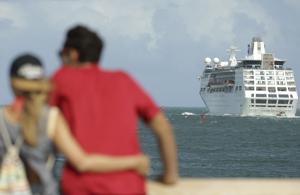Companion bills seek to preempt municipal laws in four Florida seaports

(The Center Square) – In 2019, Key West banned sunscreens containing oxybenzone and octinoxate, chemicals biologists say damage coral reefs.
In response, during the 2020 legislative session, Florida lawmakers adopted the “Florida Drug and Cosmetic Act,” which prohibits local governments from regulating over-the-counter drugs or cosmetics.
In November, 63 percent of Key West referendum voters banned ships of 1,300-or-more passengers; 61 percent approved a 1,500-daily cap on cruise passengers; and 81 percent endorsed prioritizing passengers from cruise operators with the best environmental records.
In response, during their 2021 legislative session, which kicked off Tuesday, Florida lawmakers are proposing companion House-Senate bills seeking to preempt municipal regulations in seaports.
Rep. Spencer Roach, R-North Fort Myers, who filed the House version, told the House Tourism, Infrastructure & Energy Subcommittee Wednesday that cruise-lines are federally regulated and restricting passengers violates the U.S. Constitution.
“We can’t simply have a group of 10,000 people closing down the Port of Key West and holding the state of Florida hostage to $90 million in general revenue that would come in,” Roach said.
The House Tourism, Infrastructure & Energy Subcommittee advanced Roach’s House Bill 267 in a 12-6 vote. It awaits hearings in the House Local Administration & Veterans Affairs Subcommittee and Commerce Committee before a floor vote.
Senate companion Senate Bill 426, sponsored by Sen. Jim Boyd, R-Bradenton, has been assigned to three Senate committees without a hearing.
HB 267/SB 426 would preempt Pensacola, Panama City, Key West and St. Petersburg from imposing rules in local seaports.
Before Wednesday’s vote, HB 267 was trimmed to only apply to four rather than all 15 Florida seaports, prompting the Florida Association of Counties to withdraw opposition and Rep. Rick Roth, R-West Palm Beach, to say the scale-back shows lawmakers want to address concerns “more with a scalpel than with a sledgehammer.”
John Wells, who spearheaded opposition to November’s Key West referendum, said of 287 cruise-liner 2022 port reservations, only 18 ships delivering about 6 percent of projected passenger capacity would meet the city’s criteria.
With Key West cruise passengers spending an estimated $90 million annually, Wells said the state cannot “allow port operations to be subject to shifting political winds” and urged statewide preemption.
“The economic benefits of that commerce extend far beyond the locality in which the ports are located,” he said. “Our ports should be regulated with statewide impact in mind.”
Florida’s $117.6 billion maritime industry, the nation’s second-largest, has been roiled by the pandemic, particularly its $8 billion a year cruise-line component.
Fourteen cruise-lines employ 150,000 Floridians and operate 63 ships out of five ports. More than 11.5 million passengers spent $1.05 billion ashore in 2016, according to Cruise Line Industry Association (CLIA).
Florida Ports for Economic Independence attorney Josh Aubuchon said Key West voters passed the referendum to save its endangered cruise industry by addressing “conditions made worse by the large cruise ships.”
Port of Pensacola Director Amy Miller said state preemption in locals ports will endanger communities, noting Pensacola’s port ban on vessels carrying explosives would be “violating state law.”
Preemption has been a go-to tool for Florida lawmakers for years. The 2019 legislative session generated nearly 50 proposed preemption bills and the 2020 session produced three dozen more, including the ‘Florida Drug and Cosmetic Act,’ the 94-page ‘Occupational Freedom & Opportunity Act’ and Senate Bill 1066, which blocks local governments from increasing impact fees.
Among other proposed 2021 preemption bills is SB 522, filed by Sen. Manny Diaz, Jr., R-Hialeah Gardens, which would place vacation rental regulation exclusively under state regulation and HB 55, filed by Rep. Toby Overdorf, R-Palm City, which would prevent local governments from placing design restrictions on “open lot” residences.
HB 55 advanced Wednesday through the House Local Administration & Veterans Affairs Subcommittee in a 12-6 vote. A House Commerce Committee hearing is its last stop before reaching the chamber floor.
Disclaimer: This content is distributed by The Center Square
